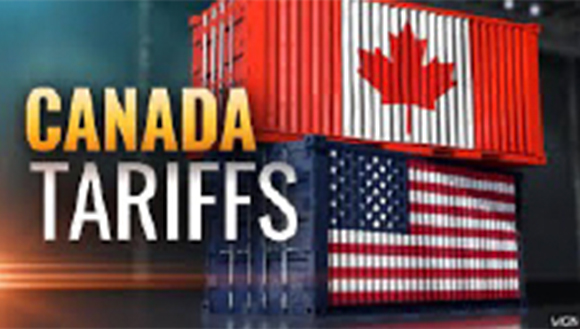Canada will impose new counter-tariffs against U.S. if it can’t make a trade deal in 30 days, Mark Carney
Canada will impose a new wave of counter-tariffs if a deal cannot be reach by July 21st.
However, Prime Minister Carney for the first time publicly acknowledged doubts about getting the American auto, steel, and aluminum tariffs and “border emergency” related tariffs lifted as he attempts to establish a more stable trading and defense partnership with the U.S.
“There is still some room to travel, so to speak, before we get to that point,” he said. “But we have a deadline in order to achieve that, and if it’s in Canada’s interest, we’ll sign it.”
Carney announced a suite of new countermeasures that will be enacted on July 21, including adjusting existing counter-tariffs on U.S. steel and aluminum products.
Speaking in Ottawa Carney said, “we’ll continue these negotiations, of course, in good faith.”
“In parallel, we must reinforce our strength at home and safeguard Canadian workers and businesses from the unjust U.S. tariffs that exist at present.”
“In other words, we’re going to adjust them to levels consistent with the progress that’s made at that point on the broader trading arrangements with the United States.”
Carney, who met with Trump at the G7, will also tighten federal procurement rules to bring in a modified “Buy Canadian” policy that would prioritize Canadian producers, and only extend access to federal contracts to countries that Canada has free trade deals with as well as offer tariff-free access to Canadian steel and aluminum.
In addition, Carney has introduced 100% tariffs on steel imports from countries without a free-trade agreement with Canada “to stabilize the domestic market and prevent harmful trade diversion as the result of the U.S. actions that are destabilizing markets.”
Source: Toronto Star
Carney announces new measures to protect Canada’s steel and aluminum industries
Canada is set to impose new tariffs on foreign steel and aluminum, in response to US tariffs disrupting global trade. The measures will limit the import of foreign steel and alter federal government procurement policies to favor the use of Canadian steel and aluminum.
The U.S. imposed a 25 per cent tariff on all steel and aluminum imports in March and Canada responded with 25 per cent counter-tariffs on U.S. steel and aluminum products. But Canada has not changed its tariffs since Trump increased U.S. tariffs on steel and aluminum to 50 per cent on June 3.
Prime Minister Mark Carney said he would review counter tariffs on U.S. steel and aluminum in July based on how much progress is achieved on a new trading framework with the U.S. and that Canadian counter-tariffs will be adjusted to “levels consistent with progress made in the broader trading agreement with the U.S.”
Although the U.S. tariffs affected all countries, one of their consequences is that steel that would have sent into the U.S. may be diverted into Canada to avoid the U.S. tariffs.
One of the new measures he introduced will establish a “tariff rate quota,” which will limit the amount of steel a foreign country can export to Canada based on how much it exported in 2024.
But a lobbying group for the country’s largest steel producers, the Canadian Steel Producers Association and the United Steelworkers Union, say the moves are not enough.
The two steel organizations issued a joint statement June 19 saying Carney’s plan “falls short of what the industry needs at this most challenging time.”
“We will continue to review the details of the measures and work constructively with the federal government to get a plan that works for Canadian steel producers and the thousands of workers that make up our sector.”
Sources:
Financial Post
Toronto Star












